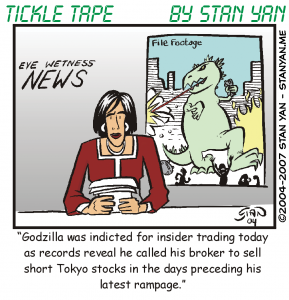Market action is powerfully influenced by fear and greed. But fear and greed aren’t the only emotions that influence market decisions. Other emotions, such as disappointment and regret, can also impact what traders do. We feel disappointed when our trades fail to meet our expectations. We feel regret when we think that we have made a poor decision that could have easily been avoided.
There’s an assumption that underlies both emotions: We may believe irrationally that as traders we must always be right and that trading outcomes must meet our expectations. Unless our expectations are met, we believe it’s terrible, awful, and unacceptable. This core assumption, however, can be questioned. And by doing so, you will be able to cultivate a peak performance mindset more easily.
It may be unpleasant, or an inconvenience, when our expectations are not met, but it isn’t so terrible, awful, or unacceptable. By merely changing our perspective on this issue, we can change how we respond emotionally to trading setbacks.
If we believe they are rare, for example, and that they are terrible awful events, then we are going to be prone to experience extreme feelings of disappointment and regret. However, if we assume that setbacks and losses are inevitable, we will be prepared to cope with them. We will come to expect them, and we are likely to think that they aren’t as terrible or as awful as we had assumed they might be. By taking an anticipatory approach to trading, not only can we rein in our emotions, but put a trade in the proper perspective.
It is wise to remember, for example, that a single trade is just one trade among a series of trades and the only outcome that matters, in the end, is the overall profit across the series of trades. Across the series of trades there will be winners and losers, but usually, more losers than winners. Once we accept this fact of trading, we will be able to see that setbacks aren’t as terrible and devastating as we had thought. They are just part of the game. There’s no point in overreacting.
You can control unpleasant emotions by taking the proper perspective. Humans tend to overstate the adverse effects of a dreaded outcome. And there are a few simple strategies we can use to control these emotions. For example, if we control our risk on the trade, and plan it out carefully, the risk will be minimized and the actual potential loss will not be catastrophic at all.
Once the risk is truly minimized, a useful thinking strategy can be used; remind yourself, “I’m making more out of the potential loss than it deserves; it is not going to be as unpleasant as I’m thinking it will be.” Another way to minimize disappointment and regret is to try to impersonalize the trade. Think in terms of probabilities, “This is just one of many trades. The outcome of this single trade means nothing. The big picture is all that counts.” By reminding yourself of the relative insignificance of a single trade, you’ll minimize the potential regret should you lose.
Similarly, it’s also important to avoid over-interpreting the significance of trade; a single losing trade (or even a few losing trades) doesn’t mean that you have poor trading skills; it may just be a run of bad luck. There’s no point in making the outcome of a trade symbolic of your skills as a trader. And, most importantly, never put your self-worth on the line with your money. You’re a professional. The outcome of the trade should not influence the positive view you have of yourself as a person.
Don’t let regret and disappointment influence your trading decisions. Keep in mind that if you make a losing trade, you may feel a little disappointment or regret, but you can handle it. Control your emotions. You’ll feel more free and powerful, and in the long run, you’ll achieve the profitable results you’ve been seeking.


